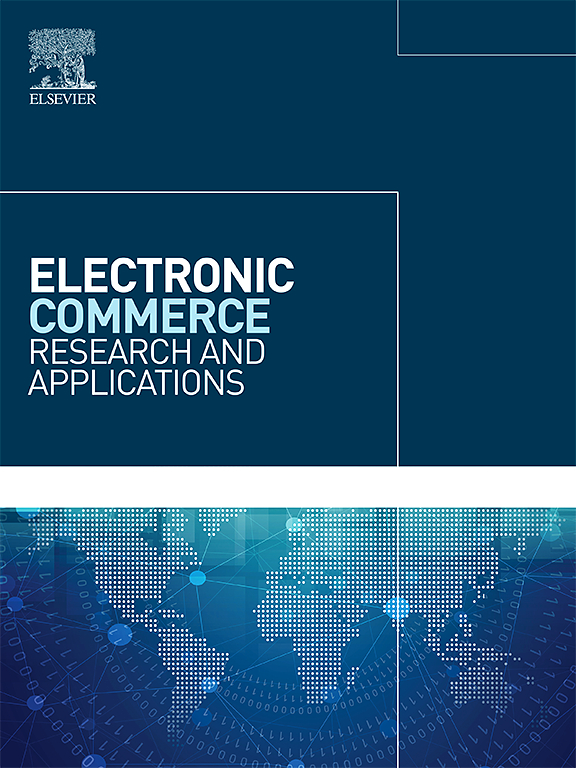大语言模型遇上混沌:一种新的虚假评论检测深度学习模型
IF 5.9
3区 管理学
Q1 BUSINESS
Electronic Commerce Research and Applications
Pub Date : 2025-06-10
DOI:10.1016/j.elerap.2025.101521
引用次数: 0
摘要
检测虚假在线评论对电子商务生态系统至关重要。然而,现有的研究往往不能挖掘评论的内在属性,这限制了检测的性能。本文介绍了一种新的假评论检测模型LLMChaos,该模型从大语言模型(llm)和混沌理论的角度来研究评论。具体而言,我们首先提出了一种将能量选择与llm相结合的方法来生成复习时间序列。其次,我们构建了包含评论内在属性的多混沌属性空间映射机制。最后,我们设计了一个分层学习网络,在LLM层、混沌属性层和Transformer层之间进行深度对比学习训练。大量的实验表明,LLMChaos是鲁棒性和最先进的。例如,在酒店数据集上,LLMChaos达到了94.78%的F1,比最近的模型高出1.42%-19.78%;在Amazon数据集上,LLMChaos达到了93.15%的F1,比最近的模型高出1.45%-18.39%。此外,我们还做出了一些新的发现,例如评论的混沌行为通常表现出有限的范围:Lyapunov指数(0-0.0125)、相关维数(0.25-0.5)、Kolmogorov熵(0.75-0.85)、分形谱(0-1.5)和复发率(0.005-0.015);真实评论和虚假评论呈现出明显的混乱分布。本文章由计算机程序翻译,如有差异,请以英文原文为准。
Large language model meets chaos: A new deep learning model for fake review detection
Detecting fake online reviews is crucial for the e-commerce ecosystem. However, existing studies often fail to mine the intrinsic attributes of reviews, which limits detection performance. In this paper, we introduce a novel fake review detection model, LLMChaos, which investigates reviews from the perspectives of large language models (LLMs) and chaos theory. Specifically, we first propose a method that blends energy selection with LLMs to generate review time series. Second, we construct a space mapping mechanism with multiple chaotic attributes, embracing the intrinsic attributes of reviews. Finally, we design a hierarchical learning network that trains in deep contrastive learning across LLM layers, chaotic attribute layers, and Transformer layers. Extensive experiments demonstrate that LLMChaos is robust and state-of-the-art. For instance, on the Hotel dataset, LLMChaos achieves 94.78% F1, outperforming recent models by 1.42%-19.78%; on the Amazon dataset, LLMChaos achieves 93.15% F1, surpassing recent models by 1.45%-18.39%. Moreover, we contribute novel discoveries, for example, chaotic behaviors of reviews generally exhibit bounded ranges: Lyapunov exponent (0–0.0125), Correlation dimension (0.25–0.5), Kolmogorov entropy (0.75–0.85), Fractal spectrum (0–1.5), and Recurrence rate (0.005–0.015); real and fake reviews display distinct chaotic distributions.
求助全文
通过发布文献求助,成功后即可免费获取论文全文。
去求助
来源期刊

Electronic Commerce Research and Applications
工程技术-计算机:跨学科应用
CiteScore
10.10
自引率
8.30%
发文量
97
审稿时长
63 days
期刊介绍:
Electronic Commerce Research and Applications aims to create and disseminate enduring knowledge for the fast-changing e-commerce environment. A major dilemma in e-commerce research is how to achieve a balance between the currency and the life span of knowledge.
Electronic Commerce Research and Applications will contribute to the establishment of a research community to create the knowledge, technology, theory, and applications for the development of electronic commerce. This is targeted at the intersection of technological potential and business aims.
 求助内容:
求助内容: 应助结果提醒方式:
应助结果提醒方式:


